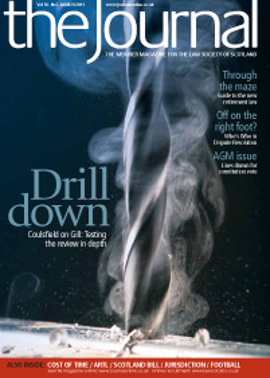Lay help... official

Sheriff court rules amendments
The Act of Sederunt (Sheriff Court Rules) (Miscellaneous Amendments) (No 2) 2010 came into force on 13 December 2010 and 1 January 2011. The most significant amendments bring in provision for “lay support”. A party litigant can now be assisted by a lay person in proceedings, be they ordinary cause, summary cause, small claim, or summary application.
The role of the lay person is assistance and advice to the party litigant who is actually conducting the proceedings. The lay person may not receive any payment for such assistance and advice. They may be prohibited from performing such a role if the sheriff considers that the individual is unsuitable or that giving permission to such a person to assist would hinder the efficient administration of justice.
There is no longer any requirement to intimate to a local authority in actions in which a non-resident parent seeks residence. Instead, in any family action in which residence is sought, a sheriff may order intimation upon a local authority. Intimation requires to be made within seven days of the order.
Jurisdiction
This is also of interest regarding insolvency, but it seems to me that the decision is of greater significance generally in relation to jurisdiction. In Menzies and Anderson, Petrs, Edinburgh Sheriff Court, 14 January 2011, Sheriff Holligan required to consider an application for the removal of one joint liquidator and the appointment of a replacement in a number of liquidations. Sheriff Holligan accepted that whilst this could be achieved in terms of s 172(6) of the Insolvency Act 1986 and accompanying rules, this procedure was expensive and it was appropriate to follow the procedure laid out in Geddes, Petr 2006 SLT 664 for a single application to be entertained by the court to achieve this result in all the liquidations.
The next problem was that the liquidations were in dependence in various sheriff courts in Lothian & Borders. Sheriff Holligan noted that his jurisdiction was sheriffdom wide and not restricted to a particular sheriff court district, and considered that he had the power to grant the order to have effect in all the liquidation processes. Whether such a power should be exercised was a matter for the sheriff’s discretion. A litigant did not have an unqualified right to have an interlocutor pronounced by a sheriff in the sheriffdom but presiding in a court outwith the “correct” district. The relevant facts and circumstances which justified the sheriff exercising judicial discretion in any particular way would vary dependent on the particular facts of each case. Matters such as urgency, avoidance of delay, and minimisation of expense might well be relevant.
Adjudication
Hull v Campbell [2011] CSOH 24 (2 February 2011) was an action for declarator of expiry of the legal and adjudication of the defender’s property as the pursuer’s, in respect of a debt to which nothing had been paid over a period exceeding 18 years. The defender argued that decree could be refused in the event of the value of the property exceeding the sum due without any compensation paid to the debtor. Although there was little or no direct authority, Lord Turnbull considered that the court had the power to avoid an unjust result which would occur if a creditor was adjudged of a debtor’s property, the value of which exceeded the extent of the debt.
Undue delay
In Peacock Group plc v Railston Ltd [2010] CSOH 173 (24 December 2010) Lord Emslie was moved to dismiss an action on the basis of undue delay. The ground of action arose in July 2001. The pursuers sued the main contractors in a shopfitting contract; subcontractors were convened as third parties. The present action had been raised in 2009. A preceding action had been dismissed two years before, after physical productions borrowed from process in 2003 by the pursuers had apparently been lost. The third parties had not had the opportunity to examine these productions by that time, and the Lord Ordinary dismissing the action indicated that the prejudice suffered by the third parties was so severe and irremediable that the action could not in fairness continue. The items were found in December 2008 and the action was raised in January 2009 with the third parties convened a month later. It was anticipated that any proof would not take place until 2012.
Lord Emslie did not consider that the delay was inordinate and inexcusable. Had the action been raised close to the expiry of the prescriptive period, it would be at a similar procedural stage to the present action. The missing components were now available for examination by the third parties’ expert. Photographs taken at the time of a previous examination would be useful for comparison purposes.
At the end of the line?
In Prentice v Sandeman [2011] CSOH 18 (28 January 2011) Lord Stewart was invited to dismiss an action on the basis that the closed record produced by the party litigant pursuer was not in proper form. Lord Stewart agreed that the record was a mess and as a result a judicial determination could not be made without unreasonable and possibly fruitless application of resources. His Lordship however did not dismiss the action, as to do so might invite prescription issues if a second action was raised, and there might be the basis of a claim by the pursuer.
On the other hand in Aikman v Bond [2011] CSIH 11 (28 January 2011) the Inner House refused an appeal against an order to find caution. Lord Bonomy indicated that after an examination of the whole procedural history, the defender was simply delaying the inevitable.
In Burke v Bayne Services (Edinburgh) Ltd [2011] CSOH 14 (4 February 2011) Lord Justice Clerk Gill refused to allow leave to amend because of the stage the proceedings had reached, no amendment had been tendered to date, and the court was not prepared to delay matters further. The decision of Lord Hodge in MRK 1 Ltd v Sakur [2011] CSOH 34 (17 February 2011) is another example.
Amendment
More as an aide mémoire, in Rodewald v Taylor [2011] CSOH 05 (18 January 2011) Lord Bannatyne refused a minute of amendment proffered by the pursuer as it did not cure the defect in that party’s pleadings. Indeed it created more confusion. It was not in the interests of justice to allow the amendment. The decision is nothing startling. I simply refer to it as a reminder that the effect of any amendment should be considered. Does it cure the existing problem in the averments? Although his Lordship did not ultimately require to consider the issue, the defender also pled that all parties were not called. The test for such a plea was referred to by counsel, being that all parties whose appearance or failure to appear was necessary to have the question at issue determined have not been called. The point behind the plea was that there were other persons who had not been called as defenders and whose absence prejudiced the defender either in his defence or in his position in the event of his defence being repelled.
Late productions
An issue arose in M v M [2011] CSOH 33 (15 February 2011) concerning late productions. The decision (appendix) is simply referred to as an example of such a motion being refused, the sort of arguments made for and against the motion, and Lady Clark’s reasoning in refusing the motion.
Affidavits
In Timeshare Management Services Ltd v Loch Rannoch Highland Club [2011] CSOH 23 (2 February 2011) Lord Glennie made observations regarding the use of affidavits and witness statements. If such documents were used, the intention was that the evidence of a witness was contained in the affidavit and thus lengthy and extensive examination in chief of the witness was to be avoided. Questions should be restricted to new points which might have arisen.
Summary applications and Child Support Act
In two appeals from Dumfries Sheriff Court, Temporary Sheriff Principal McKay required to consider a number of points in applications for a warrant to imprison in respect of failures to pay sums decerned in liability orders. In Secretary of State for Work and Pensions, Child Support Agency v O’Donnell, 11 November 2010 the sheriff principal decided that it was competent to continue a summary application raised to obtain orders in terms of ss 38-40B of the Child Support Act 1991. Such applications were not directly analogous to applications for civil imprisonment in terms of the Civil Imprisonment Act 1882. The procedure was dictated by the Sheriff Court (Scotland) Act 1907 and the summary application rules of 1999. Further, it was for the applicant to establish that the debtor fell within the category against whom such an order could be made. The 1991 Act contemplated the threat of imprisonment hanging over the debtor to compel payment. Further, written pleadings were used for such applications. Continuations were competent and legitimate for the purpose of achieving payment without imposing disqualification or imprisonment. How long and how often were matters for the discretion of the sheriff.
The sheriff principal further considered that it had been inappropriate for the sheriff to comment on the content of the note of appeal without any invitation from the appellate court.
In Child Maintenance and Enforcement Commission v Davies, 11 November 2010 the sheriff principal allowed an appeal against the dismissal of a similar application when the pursuers sought a warrant to arrest the defender. There had been a long history of difficulty in getting the defender to appear. The sheriff principal was prepared to infer that he was trying to evade the proceedings. Section 39A of the 1991 Act required the sheriff to hold an inquiry. The grant of a warrant to arrest was the means of achieving such an inquiry.
In this issue
- The case for full disclosure of laboratory case files
- Why join the Scottish Family Law Association?
- Above board
- Time to be counted
- Taking out rejections
- Updating the constitution
- Every bit helps
- Retiring the default age
- Keeping a grip on cash
- Watch this space
- The diehards
- Win-win ways
- "Virtual fair" opens for career options
- Law reform update
- Society's in-house work under scrutiny
- Watching over the constitution
- All aboard life's U-bend
- Ask Ash
- Working to advantage
- Frauds and scams beware
- Lay help... official
- Lacuna manufacturing
- This time it's NOT personal
- Fairness and trust
- Pensions: redefining value
- Sharing the spoils
- World IP Day 2011 approaches
- Life v reputation
- Book reviews
- ARTL, by degrees
- Contaminated land - the story continues






